
Reading My Friends 9
These poems showcase a human being observant. Scott wig german immerses us in space and time: this year, this month, this day, this hour, in Austin, in Mueller Lake Park, this rock, this bird. This is the humanist meaning of being observant: a human observant of being alive in this world in relationship with other living things. Scott does not give these things meaning, he receives, respects, observes, their inherent meaning.

Reading My Friends #8
If you didn’t catch on, both of these poems are sonnets, or variations of sonnets. The book includes 87 poems in six sections, and two-thirds, or so, of those poems are sonnets, or rather they are 14-lined poems with rhyme. And each of them, end, similar to Shakespearean sonnets, with a rhymed couplet. However, if you pay attention, you will notice that some of the poems are not pentameter, but tetrameter, and you will notice that the rhyme schemes vary quite a bit, so the rhymes are unexpected.

Reading My Friends #7
Larry D. Thomas’ range of topics is actually immense: lighthouses, Mississippi cotton, apricots, circuses, art museums, Maine lobstermen. And in today’s book: bikers—you know, those tattooed men on Harleys with bleach-blonde women holding on behind them. The roar, the danger. The Fraternity of Oblivion is a hard book, a dark book, and perhaps, as Nietzsche might say, an exercise of staring into the abyss. Be forewarned—this book is not for those seeking roses and lemonade.

Reading My Friends #6
I met David Anthony Sam on-line during the pandemic. I needed to connect with poets and somehow ended up finding his zoom meetings of the North Central Region of the Virginia Poetry Society, even though I do not live in that region. He welcomed me, ran a good meeting, so I began to look up his poems.

Reading My Friends, #5
Today, I am going to do something a little different. I have chosen to read three of Alan Berecka’s poems that are about mutual friends. So this episode can be called “Reading My Friend Reading Our Friends.”
Alan is the author of five books of poems, and two chapbooks. Here is a link to his webpage so you can learn more about him and them. More or less at random, I have pulled from my shelves his second book, Remembering the Body. The book contains 71 poems in two sections, more or less equally divided between the ideas of the human body and the body of Christ.
We will read Alan’s poems dedicated to Larry D. Thomas, Angela Alaimo O’Donnell, and Jill Alexander Essbaum.

Reading My Friends, #4
Lately, I have been reading Jealousy Cured by my friend Richard Lance Scow Williams. I have known Ric for something like thirty-plus years. He contributed several articles for MAN! magazine, back when some us old farts were committed to becoming better men. Ric is famous for being a writer and editor for Austin’s alternative paper, The Austin Chronicle. His Litera Section in the Chronicle kept Austin’s underground and above-ground poets connected. Each week he signed off his on-going manifesto for more poetry with vaya con dios.
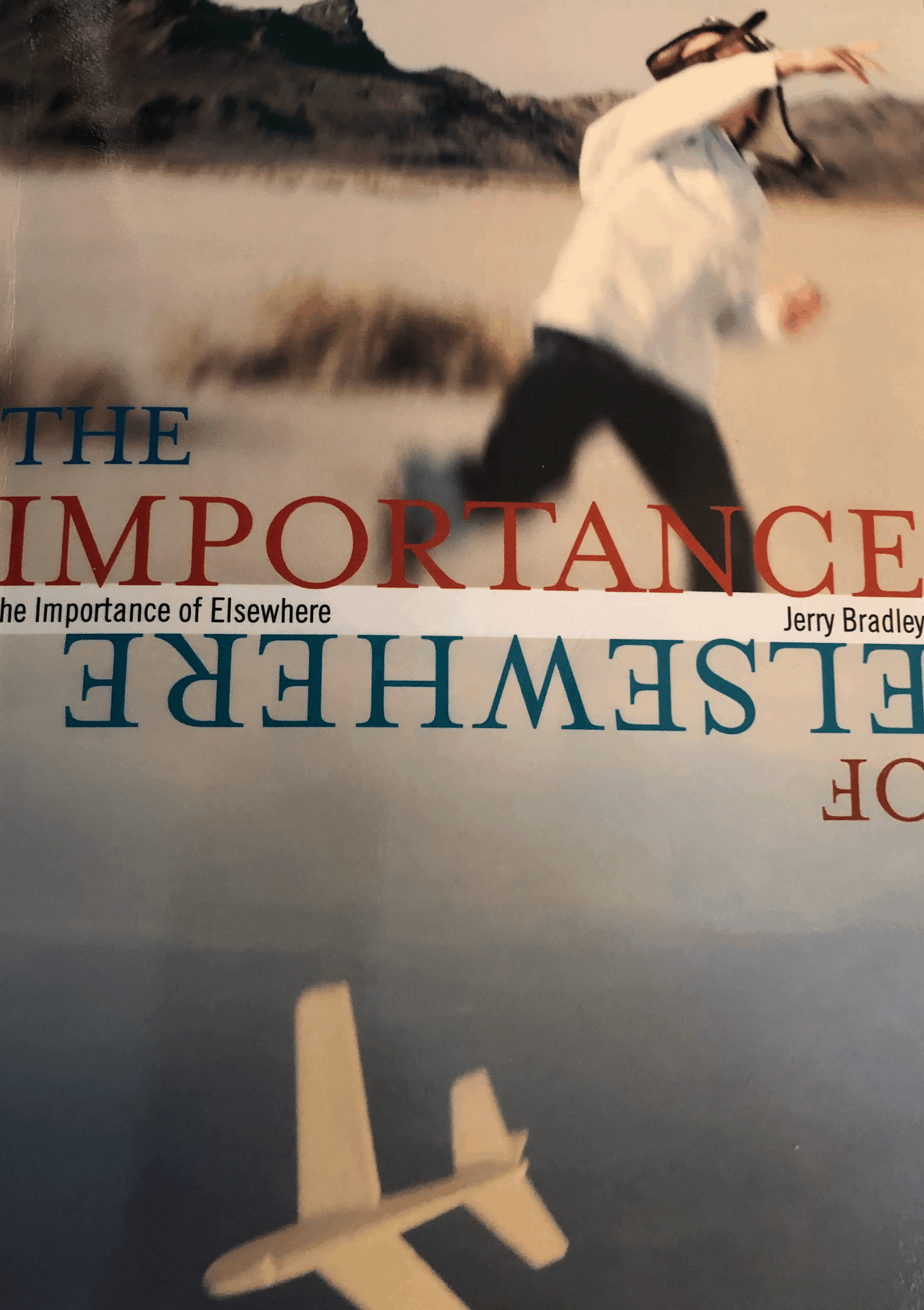
Reading My Friends, #3
I hope Jerry doesn’t hate me for saying this, but the poems in this book are the kind I could see Sammy [of Updike’s story “A&P”] writing once he had earned his doctorate in literature at state schools. Clever, wry, sophisticated, but without losing touch with one’s natural vocabulary, critical of conventional life while still accepting one’s place in a society where sexual pleasure and mortality walk hand in hand.
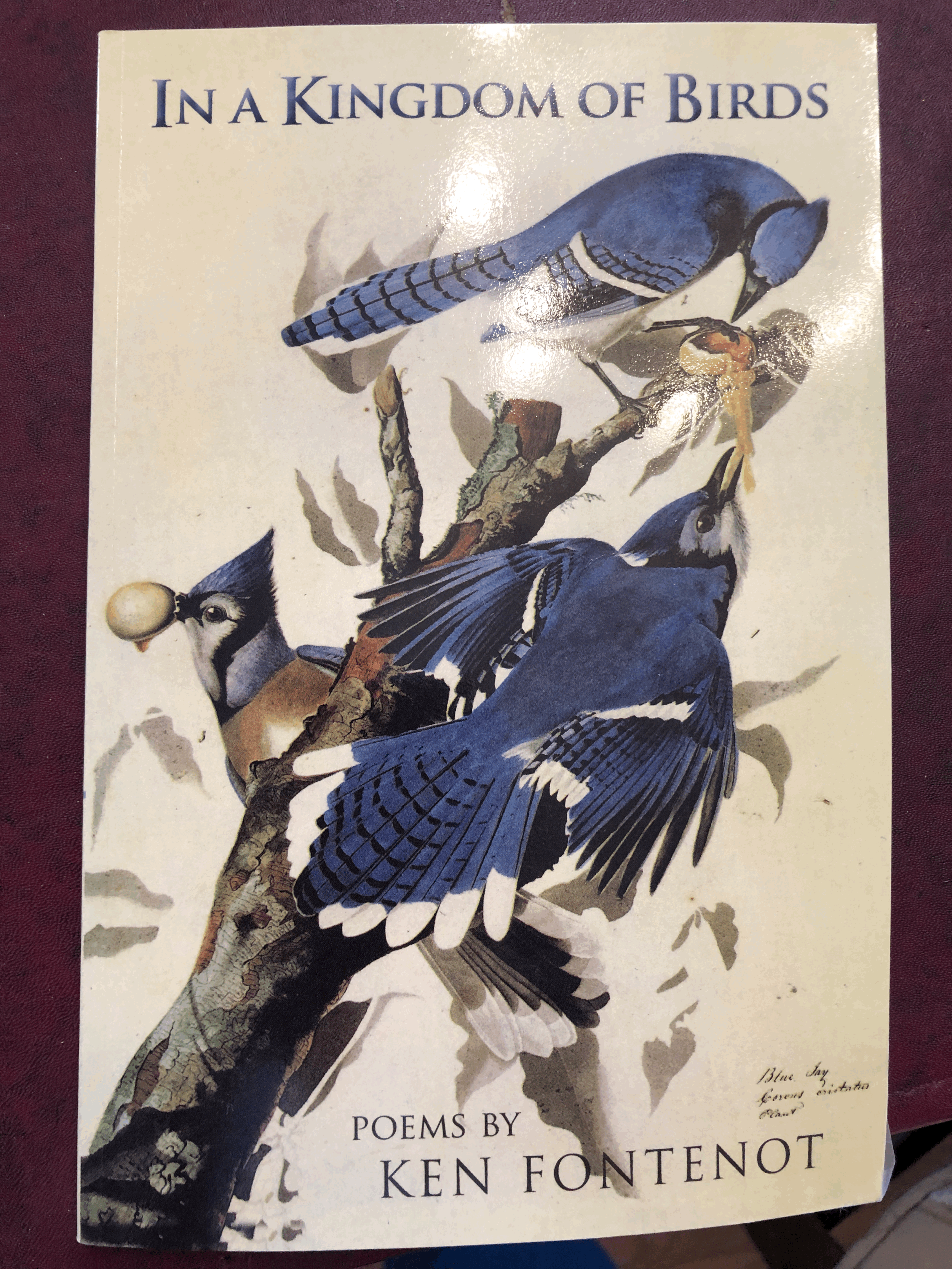
Reading My Friends #2: In a Kingdom of Birds by Ken Fontenot
I admit then, right off the bat, that this book is not what I expected. I expected, what? Birds. Exquisite observations of the natural world. I knew Ken to be a deep reader of American and world poetry. I knew him to be a serious craft person, a “Real Poet,” who drafted and revised and worked his poems every day. Living in music and metaphor. Looking outward, observing. All that is here, But

Reading My Friends #1: Losing Mogadishu by Mark E. Harden
But the real effect of the book is not the story but the mood and texture of a mind and emotional structure. There are traumas, but the heart of the book is the songs (in prose and poetry) one sings to one’s self post-trauma, because there really isn’t any post to trauma.

Symptom and Desire: New and Selected Poems
I am glad to announce that I am publishing/have published a new book of poems: Symptom and Desire: New and Selected Poems. I have published this book through a little press I have started called 4doorloungebooks.

The Good Life, Part 3A
But Gomes’ first sentence flummoxed me right away: “Why is it important, even essential, to know that there are rules, ways, and means, by which to achieve the good life?” Rules? Funny, I never thought of “virtues” as “rules.” The connotation of that word is just too restrictive for my undisciplined and freedom-loving self.
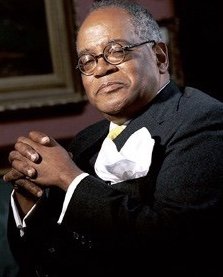
The Good Life, Part 2
The phrase “The Good Life” has been part of my brain stew for so long I can’t remember when it wasn’t in there. I assume some professor tossed it in during college, maybe the beef stock of my freshman philosophy ethics class, maybe as a root vegetable in my classical political philosophy class. Heck, it could have been my father seasoning me with the importance of studying and its future benefits. I don’t know.

19 October 2017
All this madness in my method is predictable and illustrates the issues that my gut (and maybe my brain) tells me I need to confront. Retirement for me never meant and does not mean settling down, basking in my accomplishments, and enjoying being Lyman. Maybe that is what I wish it would mean, but it doesn’t. Even at sixty-four, I don’t really know who this Lyman is that I should enjoy being.

The Good Life, Part 1
After my haircut, I stopped in and browsed, finding Thomas Moore’s Care of the Soul, which I once owned and probably read, and The Good Life by Rev. Peter J. Gomes of Harvard’s Memorial Church. Of course, I have known that all my recent readings have been dancing around that very old-fashioned conception of “the good life,” so for a mere $1.99, I grabbed it

Cogito; Therefore I Can Get Healthy
I recently reread one of my favorite little books, The Philosopher’s Diet by Washington University philosophy professor Richard Watson. In my little reflection on that book, I pointed out that in his strange little diet book he refers to Descartes on several occasions. That is because Watson is an expert in Descartes. So I walked over to the James Madison Library and checked out one of Watson’s books on Descartes, the 2002 Cogito, Ergo Sum: The Life of Rene Descartes.
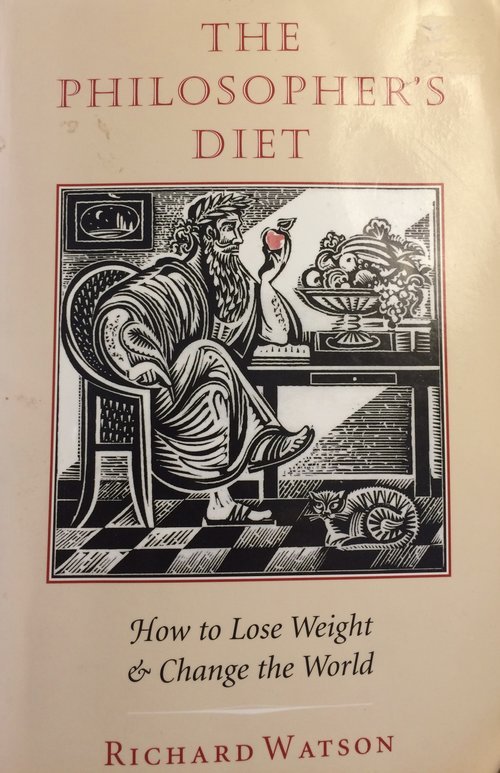
The Philosopher’s Diet
One aspect of being a retired English teacher is that all of a sudden my reading choices become my own. I have six weeks without reading for an assignment for a class (yes, I am going to do a little teaching in retirement). If I can’t read a book in a week or two, I stop midway and move on to something else. This leaves me with a half-read Tolstoy and Melville on the night stand.
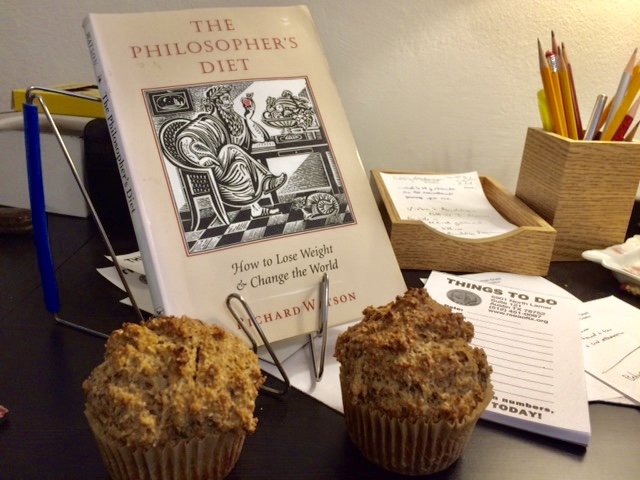
The Philosopher’s Habits
In three days, it will be five weeks since I arrived at Fernrock, retired and without much on my schedule. First, there was unpacking and getting settled. In the second week, I began exercising, swimming at the James Madison University Rec Center. It was not pretty: I think I did ten sloppy laps that first day, huffing and puffing. I began reading about habits and about gratitude, which this blog documents somewhat.
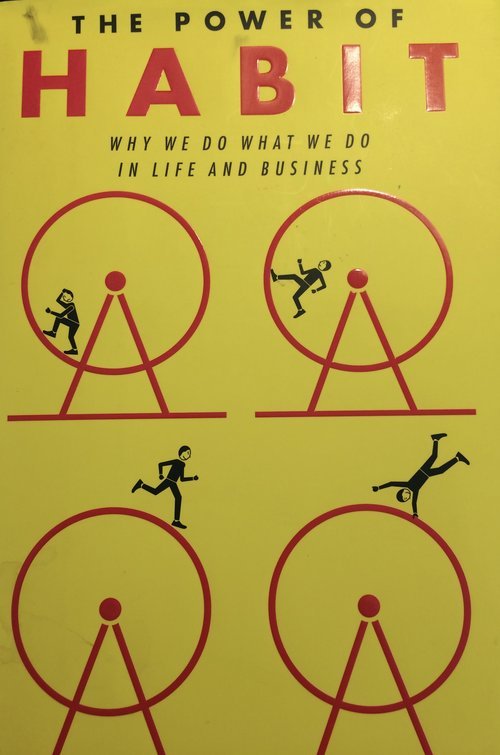
Habit Power
The first book I wanted to read in retirement was Charles Duhigg’s 2012 The Power of Habit. My reasons were simple enough. First, I had wanted to read it for a long time: I had had the book on my bookshelf since it was published five years ago. Second, the reason I wanted to read it is that I sometimes think I have some bad habits I don’t need, and that I don’t have some good habits that I do need. Third, as I have said elsewhere in these posts, as I have lived my later adult years, I have felt that I have lived my life in response to various outside demands, and that there was much in life that I was not of my choosing.
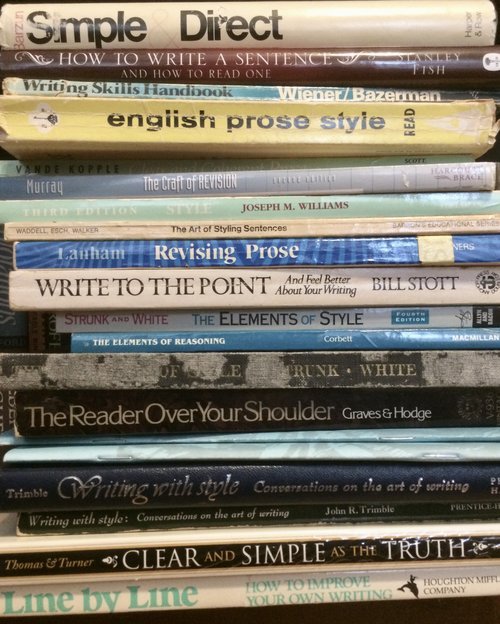
Simple and Direct
I am beginning my refresher course in writing by reading Jacques Barzun’s 1975 Simple and Direct. On the flyleaf of the book, I inscribed my name “Lyman W. Grant, Jr.,” so I am guessing I purchased the book within a few years of it publication. I dropped the “Junior” in the early eighties, and I quit writing my name in books about that time also. There came a time when books passed through my library too quickly for me to claim ownership too tightly.

Simple and Direct 2
Here in chapter 2, I think, maybe, I am learning how to read Jacques Barzun’s Simple and Direct. Chapter 2 is titled “Linking, or What to Put Next.” This follows his chapter on diction, which I reacted to in a previous post. As in Chapter 1, Barzun organizes Chapter 2 by presenting brief sections with titles, such as “Links Are Words and Ideas, Both,” “Invariables and Intruders,” and “Pronouns: The Slightest Slip is Fatal.” There are thirteen of these subheadings in this chapter. And what I have realized is that each of these is a short essay in and of itself, a friendly, informal class lecture, if you like.
